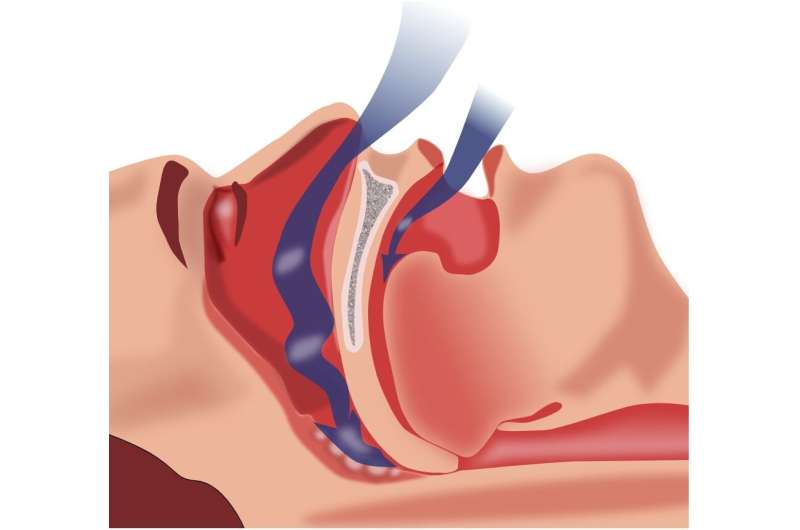This article has been reviewed according to Science X's editorial process and policies. Editors have highlighted the following attributes while ensuring the content's credibility:
fact-checked
proofread
Drug treatment shows promise for dangerous snoring condition, obstructive sleep apnea

Patients taking sulthiame, a drug currently in use for epilepsy, experienced a reduction in their symptoms of obstructive sleep apnea (OSA), according to results of a clinical trial presented at the European Respiratory Society (ERS) Congress in Vienna, Austria.
Patients with OSA often snore loudly, their breathing starts and stops during the night, and they may wake up several times. Not only does this cause tiredness, but it can also increase the risk of high blood pressure, stroke, heart disease and type 2 diabetes. OSA is very common, but many people do not realize they have the condition.
The new research was presented by Professor Jan Hedner from Sahlgrenska University Hospital and the University of Gothenburg in Sweden.
He said, "The standard treatment for obstructive sleep apnea is sleeping with a machine that blows air through a face mask to keep the airways open. Unfortunately, many people find these machines hard to use over the long term, so there is a need to find alternative treatments. We also need a better understanding of the underlying mechanisms in OSA to help clinicians give more personalized treatment."
The trial was a double-blind, randomized, placebo-controlled trial—the gold-standard in medical research. It involved 298 people with OSA being treated at 28 different centers in Spain, France, Belgium, Germany and the Czech Republic. All the patients could not tolerate or refused to use continuous positive airway pressure (CPAP) machines or mouthpieces designed to keep the airways open.
The patients were assessed with polysomnography at the start of the trial, and after four weeks and 12 weeks in the study. Polysomnography measures breathing, levels of oxygen in the blood, heart rhythm, eye movements, brain and muscle activity during a night of sleep.
The patients were divided into four groups: 74 people took 100 mg of sulthiame daily, 74 took 200 mg, 75 took 300 mg and the remaining 75 took a placebo. Sulthiame is a drug that targets the respiratory system by inhibiting an enzyme called carbonic anhydrase and stimulating the upper airway muscles.
The people taking sulthiame had fewer pauses in their breathing and higher levels of oxygen in their blood during sleep. A measure of the frequency of respiratory pauses during sleep, called AHI3a, was 17.8% lower for patients taking the lowest dose, 34.8% lower for patients on the medium dose and 39.9% lower for patients on the highest dose.
When researchers used another measure called AHI4, the effect of the treatment was close to a 50% reduction of respiratory pauses with more profound lowering of oxygen levels. OSA patients who had been feeling sleepy during the daytime also felt less so when they took sulthiame.
Side effects experienced by people taking sulthiame, such as pins and needles, headache, fatigue, and nausea, were generally mild or moderate.
Professor Hedner said, "People taking sulthiame in the trial had a reduction in OSA symptoms such as stopping breathing during the night and feeling sleepy during the day. Their average levels of oxygen in the blood were also improved with the treatment. This suggests that sulthiame could be an effective treatment for OSA, especially for those who find they cannot use the existing mechanical treatments.
"Although sulthiame is already available as a treatment for childhood epilepsy, we still need to carry out a phase III study to confirm the beneficial respiratory effects of this drug in a larger group of patients with OSA."
Professor Sophia Schiza is Head of the ERS assembly on sleep disordered breathing, Professor of Respiratory and Sleep Medicine in the School of Medicine at the University of Crete, Greece, and was not involved in the research.
She said, "Many of us know that we snore or that our partner snores. If snoring is accompanied by other symptoms, such as waking up often in the night, feeling fatigued and/or sleepy during the daytime, then it's time to speak to a doctor. Because obstructive sleep apnea increases the risk of serious health problems such as high blood pressure, heart and metabolic disease, it's vital that we diagnose and treat the condition.
"Treatments are available, but because they don't work for everyone, we need more ways to treat the disease, based on individualized diagnostic and treatment approaches.
"This is one of the first studies to suggest that a drug treatment could help some patients, and the results are promising. We need to continue testing sulthiame and other treatments to understand their long-term effects, including any side effects. For example, we'd like to see whether treatment can help with lowering blood pressure and preventing cardiovascular disease for people with OSA."
More information: Abstract no: OA5433 "Late Breaking Abstract - A randomized, double-blind, placebo controlled, dose-finding trial of sulthiame in obstructive sleep apnea", by Jan Hedner et al; Presented in session, "Emerging insights in prognostic aspects and positive airway pressure treatment for obstructive sleep apnoea" at 14:15-15:30 CEST on Tuesday 10 September 2024. k4.ersnet.org/prod/v2/Front/Pr … ?e=549&session=17922


















